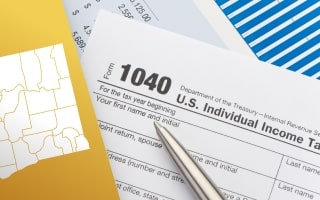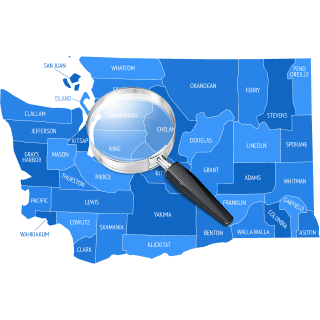Property Tax Records in Washington

When you buy a home in Washington, there are numerous fees and taxes that you'll need to keep track of. For example, all homeowners in Washington owe property taxes that are due annually. Nationally, the average property tax rate is 0.99%. In Washington, the average tax rate is just 0.84%. Because of high home values, the median tax payment is just over $4,000 per year.
One reason real estate taxes in Washington are lower than the national average is that the state has numerous laws that limit the amount property owners can be taxed and restrict the amount that taxes can increase per year.
Washington property taxes are based on the tax rate in your county and the assessed value of your home. While property values can be updated every year based on statistical data, county assessors are required by law to visit properties and reappraise them every six years. Once your home is reappraised, you'll receive your tax bill.
Tax bills are mailed out in February each year. You must pay your taxes in two installments, which are due by April 30 and October 31.
From 1853 until the 1930s, the main source of revenue in Washington was property taxes. During the Great Depression in the 1930s, the state broadened its tax structure to collect revenues from many different sources, which is one reason why the tax rates in Washington are currently below the national average.
Property Tax Assessment in Washington

The taxes you pay on your Washington property are based on the value of your home as well as the tax rate in your county. As mentioned before, physical inspections of homes only need to occur every six years. However, assessed values will be updated annually, which means that your property taxes in Washington can change every year.
Keep in mind that a home's assessed value isn't the same as its market value. County assessors are required by state law to set assessed values at 100% of market values. If you buy a home with a $400,000 market value, the assessed value will be the same. County tax rates vary based on the taxing authority's total budget.
Property tax rates throughout Washington are separated into ones that have been approved by voters and ones that haven't. Rates that aren't approved by voters support the general functions of counties and municipalities. Voter-approved taxes typically have specific purposes. For example, these taxes could be used to pay for the parks district.
Even if the tax rate in your county is 0.80% and the city rate is 0.75%, the general rate will only be 1%. Property tax rates that haven't been approved by voters are limited to 1%. These rates are displayed as dollars per thousand in total assessed value.
You can also estimate the amount of property taxes you'll pay for a home by using the county's effective tax rate. Once you identify this rate, multiply it by your home's full market value. If you live in a county with an effective tax rate of 1%, your annual taxes will be $4,000 for a $400,000 property. The average tax rates in the most populous Washington counties are:
- King County: 1.05%
- Pierce County: 1.28%
- Snohomish County: 1.09%
- Spokane County: 1.20%
- Clark County: 1.09%
As you can see, Pierce County property taxes are more expensive than those in Kings County and other counties in Washington. However, property taxes in Washington State are, on average, not high, even in desirable areas.
Calculate Washington Taxes
A Washington property tax calculator is a valuable tool for homeowners and real estate investors who want to better understand how property taxes are calculated across the state. Washington property taxes are assessed based on the property's market value, with rates set by local taxing districts, including counties, cities, school districts, and special purpose districts. The calculator allows users to input key details such as location, assessed value, and property use to estimate their annual tax liability based on the specific levies in their area.
In addition to estimating taxes, the calculator can help identify exemptions and relief programs that may reduce your overall tax burden. Washington offers several options, such as the Senior Citizen and Disabled Person Property Tax Exemption, which freezes the assessed value of a qualifying homeowner's residence and may exempt a portion of taxes entirely, depending on income and age. There’s also a Property Tax Deferral Program available for eligible seniors and disabled homeowners. This tool makes it easier to see how these programs can affect your tax bill and help plan accordingly.
using our property tax calculator.
Washington Property Tax Records: What Are They?

The taxes that Washington collects from property owners make up nearly 30% of all local and state tax revenues. While state and county governments can use these revenues to pay for many types of local services, they typically fund parks, fire protection, and public schools.
If you want to purchase a home in Washington but still need to do some research on it, a lot of property information is available to the public. Most counties in Washington host online databases that anyone can access. For example, King County offers a database that allows you to search for residences in the jurisdiction by property name, address, or parcel ID. When you find a property, you should receive the following details:
-
Parcel number
-
Owner name
-
Site address
-
Legal description
-
Year built
-
Total square footage
-
Number of bedrooms and bathrooms
-
Condition and grade
-
Lot size
-
Annual property taxes
-
Total tax levy distribution
-
Extended tax roll history that dates back more than 40 years
-
Views
-
Waterfront details
-
Designations
-
Renovations
-
Stories
-
Sketches and photos
-
Permit history
Property Tax Exemptions and Deductions in Washington

If you're looking for ways to reduce your tax bill, you may be able to apply for a tax exemption or deduction. Homeowners have access to a few Washington property tax exemptions that can reduce property assessment values. By lowering your home's assessment value, your annual tax bills won't be as high.
Property Tax Exemption for Seniors and Disabled Individuals: This exemption is available to the following parties:
- Veterans who have a service-connected disability with a rating of 80% or higher
- People who are unable to be employed because of a disability
- Seniors who are at least 61 years old
If you meet one of these qualifications, your property taxes will be reduced by a considerable amount. However, the exact amount depends on your income, the local levy rates, and the value of your home.
Tax Deferral for Low-Income Homeowners: If the combined disposable income in your household is $57,000 or less, you may qualify for this tax deferral. The purpose of this program is to defer the second half of your tax payments. If you qualify, the deferral will remain in place until you sell the home or pass away. You must live in a Washington home for at least five years to qualify.
Tax Deferral for Seniors and Disabled Individuals: Homeowners who have a disability or are at least 60 years old can seek a tax deferral. If you qualify, you can defer your taxes until you sell the home or no longer use it as your primary residence. However, the deferred amount will accrue 5% interest until the tax is repaid. To qualify, you must own and live in a Washington home.
How To Search Property Tax Records in Washington

When you want to research a property that you're thinking of making an offer on, there are a few sources that give you the tools necessary to look for tax records. For example, the county you live in should offer an online database that gives you easy access to tax records and all the data they contain.
You can also search for tax records by using a third-party solution like PropertyChecker. This website allows you to perform searches for property information by inputting the home's address or parcel ID. You can also use the owner's name, phone number, or email address to find the necessary reports. The information that's often provided in these documents includes the following:
-
Deed records
-
Property owner names
-
Loan records, which include interest rates, terms, and amounts
-
Past sales history, which includes dates, transfer types, and prices
-
Assessed and market values
-
Property details like the number of floors and square footage
-
Property tax records
-
Neighborhood information, such as household income, demographics, and crime stats
-
Lien records
-
Building permits
-
Foreclosure records, including the original loan amount
How To Appeal Property Taxes in Washington

In Washington, county assessors typically value properties at the beginning of the year. You'll likely receive a notice that your Washington property assessment value has changed within 30 days following the valuation. Once this notice arrives in the mail, thoroughly review it to ensure the assessed value of your home is accurate.
If you believe that it has increased by more than it should, the state allows you to file an appeal. However, you must closely follow every step of this process. If you miss a deadline, your home's assessed value will be finalized. Below is a step-by-step guide to Washington's appeals process.
Step 1: To appeal the assessor's valuation, you'll need to submit the Taxpayer Petition for Review of Property Valuation Determination document. You can't appeal by phone or letter. In most counties, you'll have until July 1 or 30 days after you receive a Change of Value Notice to appeal. Make sure you provide the reasons why you're filing the appeal in the application.
Step 2: The County Board of Equalization will receive and review your appeal. Keep in mind that your hearing date can take place up to six months after you request the appeal. While you don't need to participate in the hearing, you can choose to do so by phone.
Step 3: You'll receive a decision from the County Board of Equalization within 45 days of the hearing date. If you don't agree with it, you can appeal to the Washington State Board of Tax Appeals within 30 days.
You'll need to state whether you want to take part in an informal or formal hearing. If you request an informal hearing, the State Board's decision will be final. After a formal hearing, you can appeal the decision to the Superior Court.
How Property Tax Records Impact Real Estate Transactions in Washington

Most homeowners decide to separate their annual property taxes into 12 equal amounts that are folded into their monthly mortgage payments. If you buy a home in a county with a high property tax rate, your payments can increase by hundreds of dollars per month, which is why it's highly recommended that you consider these taxes before you make a purchase.
If you're selling, buying, or investing in a Washington home, property taxes will likely have a significant impact on your real estate transaction. When purchasing a home, consider if you can afford a property after factoring taxes into the equation. If you want to buy a $400,000 home in Pierce County, the effective tax rate is 1.28%, which means that your annual property taxes would amount to $5,120. In this scenario, your monthly mortgage payments will increase by more than $400.
When buying a rental property, investors must calculate how property taxes will impact their ability to earn profits. An investor needs to charge a high enough rent to bring in more money than they spend every month, which is more difficult in locations with high tax rates. If a buyer is concerned with high property taxes in the middle of a real estate transaction, they could negotiate for the seller to reduce their asking price or pay some of the closing costs.
One type of real estate transaction that investors are often involved in is a tax foreclosure auction. As mentioned previously, most counties require property taxes to be paid in full by October 31. The first payment is due on April 30.
If a homeowner misses the initial payment, these taxes will automatically become delinquent, after which a 1% interest rate will be applied every month. If these taxes remain delinquent on June 1, a 3% penalty is assessed. Interest will continue to build until the homeowner repays all the taxes they owe.
When taxes first become delinquent, the county creates a tax lien. If the homeowner attempts to sell the property, the county is paid with the profits. However, if property taxes remain delinquent for at least three years, the county can foreclose on the property altogether. Foreclosure tax sales are usually held in February.
In most counties, investors who wish to bid on delinquent tax properties must provide a $2,500 deposit. The winning bidder will need to pay all outstanding taxes before they can claim ownership of the home. A homeowner can redeem their property and avoid the foreclosure process by paying all the taxes they owe before the day of the public auction.
Free Washington Property Tax Lookup
Tax Records Please wait...
Property Tax Guide
- Property Tax Records in Washington
- Property Tax Assessment in Washington
- Washington Property Tax Records: What Are They?
- Property Tax Exemptions and Deductions in Washington
- How To Search Property Tax Records in Washington
- How To Appeal Property Taxes in Washington
- How Property Tax Records Impact Real Estate Transactions in Washington
Instant Access to Washington Property Records
- Owner(s)
- Deed Records
- Loans & Liens
- Values
- Taxes
- Building Permits
- Purchase History
- Property Details
- And More!
Free Washington Property Tax Lookup
Tax Records Please wait...
Property Tax Guide
- Property Tax Records in Washington
- Property Tax Assessment in Washington
- Washington Property Tax Records: What Are They?
- Property Tax Exemptions and Deductions in Washington
- How To Search Property Tax Records in Washington
- How To Appeal Property Taxes in Washington
- How Property Tax Records Impact Real Estate Transactions in Washington